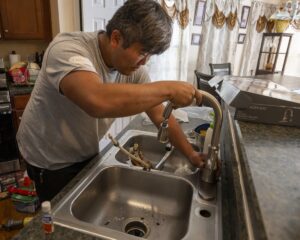Is Drano Really Bad for Your Pipes? Here’s the Honest Truth
Hey there! So you’re standing in your bathroom staring at a clogged drain, wondering if you should reach for that bottle of Drano under the sink. Before you do, let’s have a real conversation about what those chemical drain cleaners do to your plumbing. At our plumbing company here in Richmond, this is probably one of the most common questions we get: “Is Drano bad for my pipes?”
The Short Answer: Yes, It Can Be
I’m not here to demonize every store-bought product – some work fine for certain situations. But when it comes to chemical drain cleaners like Drano, I’ve seen enough damaged pipes over my years as a plumber to give you a straight-up warning: regular use can lead to serious problems down the road.
What Happens When You Use Drano
When you pour that blue liquid down your drain, it starts a pretty intense chemical reaction. Products like Drano use powerful ingredients like sodium hydroxide (lye) or bleach that essentially eat through whatever’s blocking your drain.
That sizzling, bubbling action you hear? That’s the chemical reaction breaking down organic matter – hair, grease, food particles – by generating heat and chemical decomposition. It sounds effective in theory, but here’s the problem: those chemicals don’t know the difference between your clog and your pipes.
Why Your Pipes Might Be Suffering
The Heat Factor
The chemical reaction creates significant heat – we’re talking hot enough to actually warp PVC pipes or accelerate corrosion in metal ones. If you’ve got older plumbing or pipes that are already compromised, that heat can speed up deterioration.
The Sitting Problem
If that powerful formula doesn’t clear the clog completely (which happens more often than you’d think), all those caustic chemicals just sit there in your pipes. They don’t magically disappear – they continue to work away at everything they touch, including the pipe material itself.
Beyond the Pipes
It’s not just the main pipe sections that suffer. Those chemicals can deteriorate rubber seals, gaskets, and the protective coatings inside traps and bends. Over time, this leads to leaks at the weakest points in your plumbing system.
Safety Concerns
Let’s not forget the human element here. These products are seriously caustic – they can burn skin, irritate your lungs, and pose real dangers to children and pets. I’ve had to help customers who got chemical burns after trying to plunge a drain that still had drain cleaner in it. Not something you want to experience, trust me.
When to Skip the Chemicals and Call a Pro
Here are the situations where you’re better off reaching for the phone instead of that bottle of drain cleaner:
- You’ve already tried plunging with no success
- The same drain keeps clogging repeatedly
- There’s an unusual odor coming from your drain
- You notice water backing up in multiple fixtures
- Several drains in your home are slow at the same time
- You’ve already tried chemical cleaners without results
- You want a long-term solution, not just a temporary fix
Many homeowners end up in a cycle of using chemicals, getting temporary relief, then facing the same problem weeks later – all while their pipes gradually weaken. Break that cycle with one call to a professional who can address the real issue.
How We Handle Drain Clogs the Right Way
When you call us for a drain problem, we follow a method that solves the problem without damaging your plumbing:
1. Getting the Full Story
We start by listening to you – what you’ve noticed, what you’ve already tried, and how long the problem has been happening. This helps us diagnose the issue more efficiently.
2. Proper Inspection
We don’t just guess what’s wrong. Sometimes we can spot the issue immediately, but often we’ll use specialized cameras or diagnostic tools to locate the exact position and cause of the blockage.
3. Safe Removal Methods
Instead of harsh chemicals, we use mechanical methods like professional-grade snakes, hydro-jetting equipment, or specialized hand tools. These remove the clog completely without leaving damaging residue behind.
4. Checking for Underlying Issues
We don’t just clear the immediate blockage. We check for bigger problems like pipe damage, improper slopes, or buildup that could cause repeat issues. Fixing the root cause saves you money in the long run.
Common Questions About Drain Cleaners
Is there ever a time when Drano is safe to use?
While it might not cause immediate damage in newer, all-plastic systems if used very occasionally, there’s almost always a better, safer option available. And never use it in toilets or garbage disposals!
What should I do if I already used Drano and it didn’t work?
Don’t plunge it! This can cause dangerous splashing. Call us, let us know what product you used, and we’ll handle it safely from there.
Why do my drains keep clogging despite using drain cleaners?
Chemical cleaners only create a temporary pathway through the blockage – they don’t remove the underlying cause, whether that’s buildup on pipe walls, a structural issue, or recurring debris.
The Better Way Forward
That slow drain might seem like a minor annoyance now, but using the wrong products can transform it into a much bigger (and more expensive) problem. You don’t need caustic chemicals that risk damaging your plumbing system – you need honest, skilled plumbers who will solve the problem correctly the first time.
Give us a call today, and let’s get your drains flowing properly – without putting your pipes at risk.
